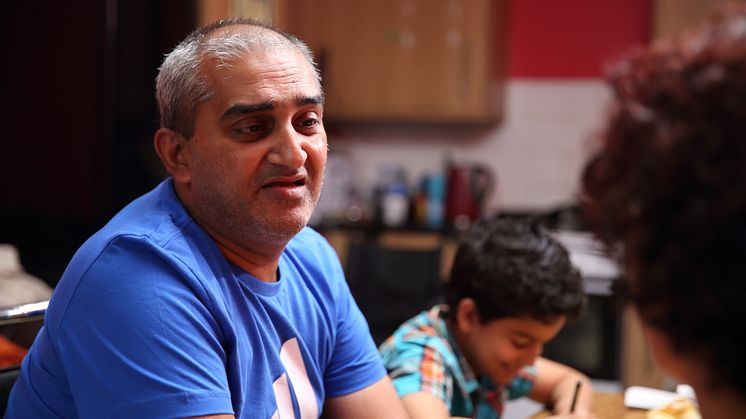
Press release -
Islington stroke survivor adds his voice to Lost for Words campaign
Islington stroke survivor Reza Curreem-Kalee, 47, is one of the thousands of people living with communication difficulties after a stroke.
Reza, a father of two, had a stroke last October. The stroke affected his speech and the movement on the left side of his body.

Reza said: “I couldn’t believe that the stroke had taken my communication. Not only did I find it scary and lonely to lose my ability to speak; it was really frustrating. I knew my family were struggling to understand what I was saying to them, and I couldn’t bear the idea that I’s lost my ability to talk to my sons like I used to. They were both so young, and couldn’t understand what was happening to their father. It was heart breaking.
“In the hospital I could only communicate by pointing at letters or showing my family words on a piece of paper – but I was determined to continue to find my voice again. We are so grateful for the Stroke Association’s support. They introduced me to a local stroke support group which has done wonders for my confidence. Being with people who understand what stroke is like means I don’t feel judged for using a wheelchair or having difficulties in finding the right words.
“Having aphasia is frightening. I wish more people knew about aphasia because it can make the world a very lonely and scary place.”

The Stroke Association’s Lost for Words campaign aims to raise awareness of the challenges stroke survivors with communication difficulties can face, and help and support available.
Michelle Dalmacio, Director of Stroke Support South at the Stroke Association, said:: “After a stroke, around one in three people like Rezahave difficulty communicating, which can be both terrifying and isolating. But with the right help and support, many stroke survivors are able to find new ways to communicate, and can rebuild their lives.
“When we first started supporting Reza we knew just how determined he was to communicate with his loved ones again. Since he has been attending our Islington Communication Support group, he’s gone from strength to strength. I’m so proud of his recovery.”
More than 350,000 people in the UK have aphasia, a communication disability which can be caused by stroke. The Stroke Association is urging people to show their support for stroke survivors who are lost for words and make a donation. For more information, visit www.stroke.org.uk/lostforwords.
Topics











